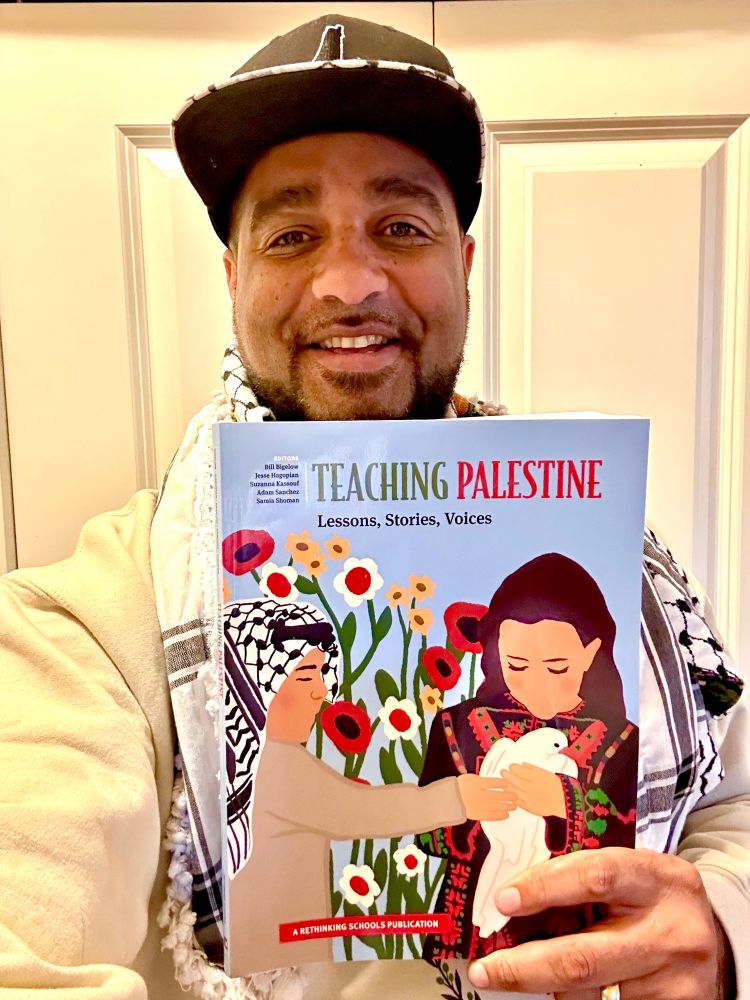
🇵🇸✊🏾🎉❤️ it is with great joy in my heart that I share that I finally have the new book I co-edited in hand!!!
For too long Palestine has been absent in the curriculum—no more!
#FreePalestine
Order today!
rethinkingschools.org/books/teachi...
24.02.2025 16:52 — 👍 60 🔁 13 💬 0 📌 0
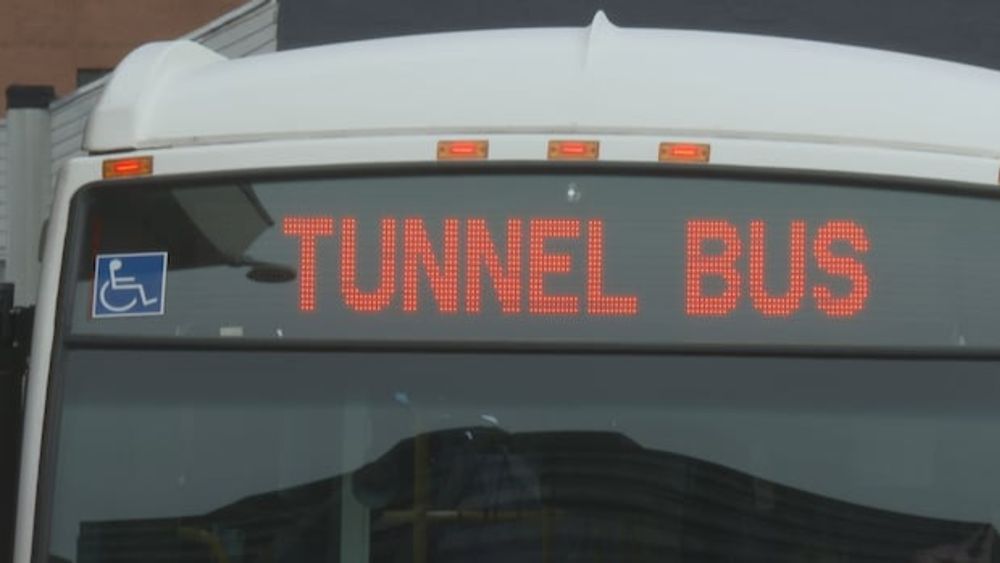
Transit Windsor bus to Detroit will end as council fails to overrule mayor's veto | CBC News
The City of Windsor will no longer offer the Transit Windsor tunnel bus route connecting the city to Detroit.
Just an incredible failure of vision & empathy. There will now be no way to travel between Windsor and Detroit unless you have a car or can pay (a lot) for a cab. Cutting the nearly century-old tunnel bus in the midst of climate & affordability crises is simply cruel. www.cbc.ca/news/canada/...
21.02.2025 15:56 — 👍 33 🔁 12 💬 3 📌 1

Teaching Against Fascism
If you’ve been paying attention to American politics over the last forty years, you may have noticed the withering away of democratic…
Teaching can reinforce the ideals of democracy, justice and equity or it can be designed for compliance and obedience.
How do educators create a pedagogy that challenges fascism during these times?
#edchat #OntEd #OntPoli
medium.com/@dan-r-scrat...
15.02.2025 21:09 — 👍 0 🔁 0 💬 0 📌 0
NEW BLOG POST -> "Teaching Against Fascism" #OntEd #AbEd #Ontpoli medium.com/@dan-r-scrat...
13.02.2025 22:46 — 👍 0 🔁 0 💬 0 📌 0
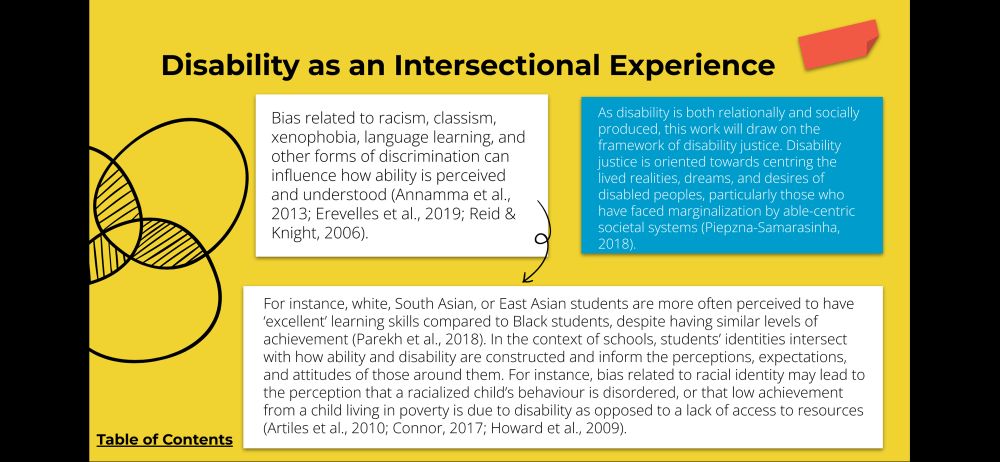
Disability as an Intersectional Experience
Bias related to racism, classism, xenophobia, language learning, and other forms of discrimination can influence how ability is perceived and understood (Annamma et al., 2013; Erevelles et al., 2019; Reid & Knight, 2006).
As disability is both relationally and socially produced, this work will draw on the framework of disability justice. Disability justice is oriented towards centring the lived realities, dreams, and desires of disabled peoples, particularly those who have faced marginalization by able-centric societal systems (Piepzna-Samarasinha,
2018).
For instance, white, South Asian, or East Asian students are more often perceived to have “excellent” learning skills compared to Black students, despite having similar levels of achievement (Parekh et al., 2018). In the context of schools, students' identities intersect with how ability and disability are constructed and inform the perceptions, expectations, and attitudes of those around them. For instance, bias related to racial identity may lead to the perception that a racialized child's behaviour is disordered, or that low achievement from a child living in poverty is due to disability as opposed to a lack of access to resources (Artiles et al., 2010; Connor, 2017; Howard et al., 2009).
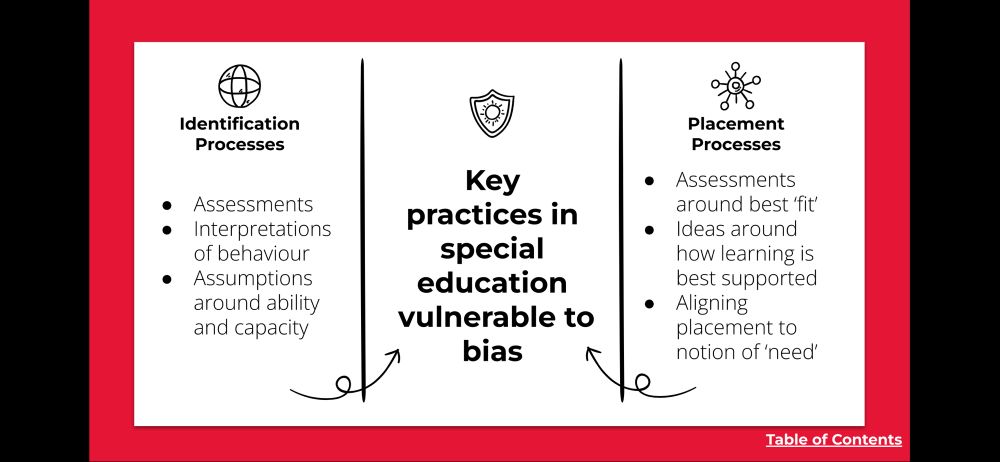
Key practices in special education vulnerable to bias:
Identification
Processes
Assessments
Interpretations of behaviour
Assumptions around ability and capacity
Placement Processes
Assessments around best 'fit'
Ideas around how learning is best supported
Aligning placement to notion of 'need'
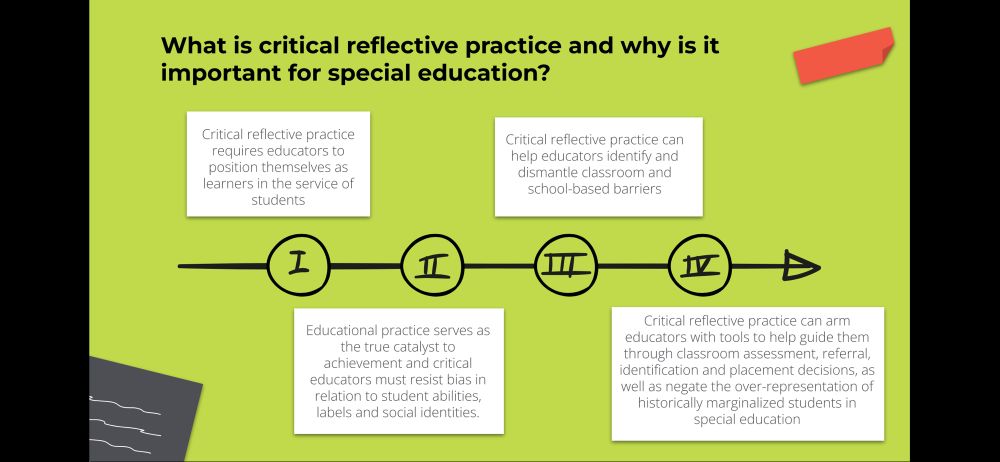
What is critical reflective practice and why is it important for special education?
Critical reflective practice requires educators to position themselves as learners in the service of students
Educational practice serves as the true catalyst to achievement and critical educators must resist bias in relation to student abilities, labels and social identities.
Critical reflective practice can help educators identify and dismantle classroom and school-based barriers
Critical reflective practice can arm educators with tools to help guide them through classroom assessment, referral, identification and placement decisions, as well as negate the over-representation of historically marginalized students in special education
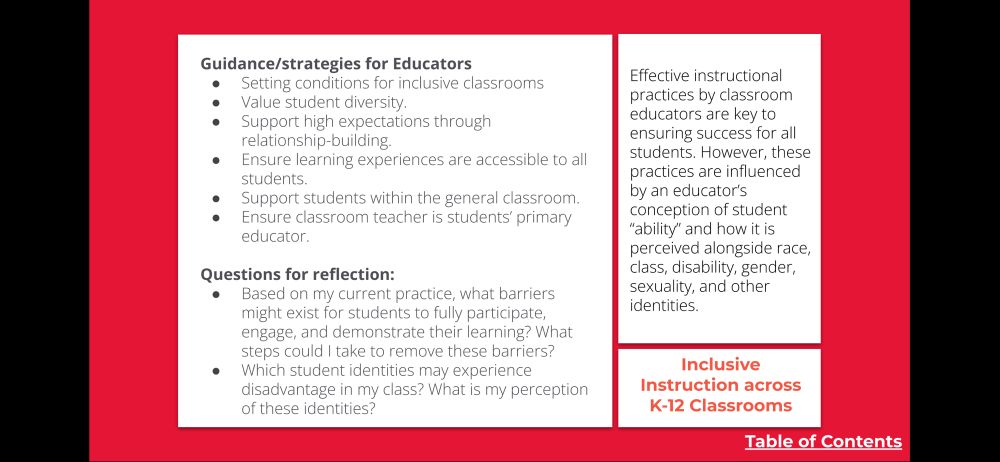
Inclusive Instruction across K-12 Classrooms:
Effective instructional practices by classroom educators are key to ensuring success for all students. However, these practices are influenced by an educator's conception of student "ability" and how it is perceived alongside race, class, disability, gender, sexuality, and other identities.
Guidance/strategies for Educators
Setting conditions for inclusive classrooms
• Value student diversity.
• Support high expectations through relationship-building.
• Ensure learning experiences are accessible to all students.
• Support students within the general classroom.
• Ensure classroom teacher is students' primary educator.
Questions for reflection:
• Based on my current practice, what barriers might exist for students to fully participate, engage, and demonstrate their learning? What steps could I take to remove these barriers?
• Which student identities may experience disadvantage in my class? What is my perception of these identities?
Now that @gparekh.bsky.social is here, I want to share her “Equity and Human Rights in Special Education: Critical Reflective Practice Guide,” which offers educators strategies to reduce the negative effects of bias & racism in decisions around special education.
www.criticalreflectivepractice.com
01.12.2024 13:27 — 👍 8 🔁 3 💬 2 📌 0
I stitched this old tweet by @ladyofsardines.bsky.social and remind myself of its truth literally every day.
09.01.2025 22:52 — 👍 836 🔁 338 💬 21 📌 20
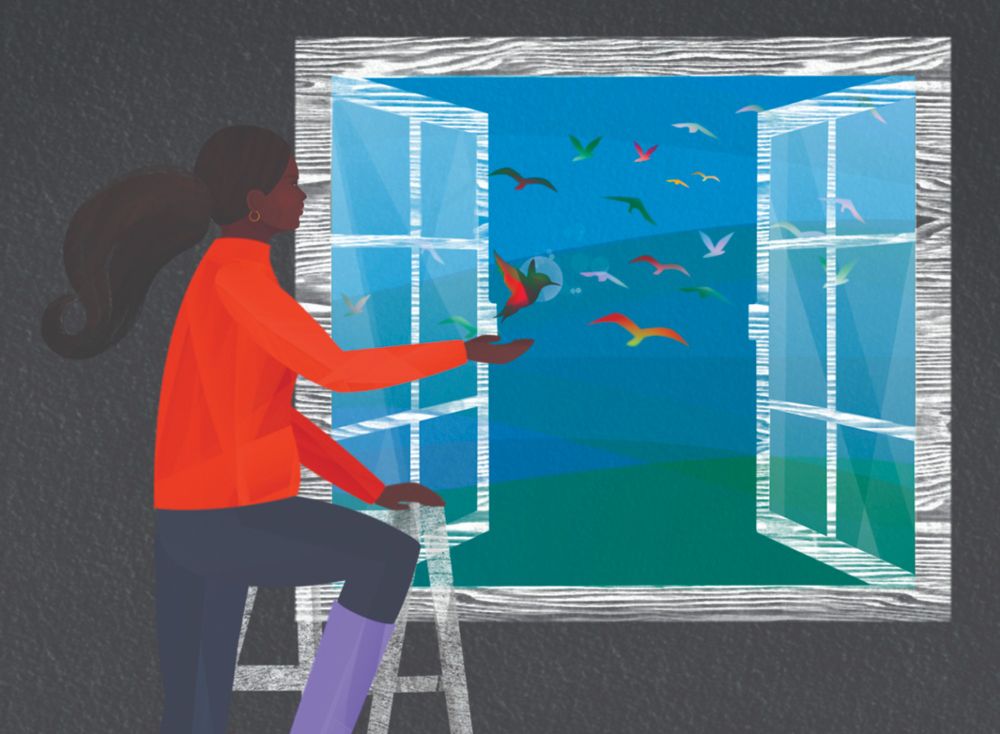
Teaching Hope in Hard Times
What makes public education so dangerous is that it is grounded in hope. As the editors of our forthcoming Teaching Palestine: Lessons, Stories, Voices write, “one of the wonderful things […]
"Building and strengthening these communities of hope is what will get us through. Students need our classrooms to be communities of hope too. Our work with young people — and with each other — needs to demonstrate that another world is possible."
rethinkingschools.org/articles/tea...
14.01.2025 03:07 — 👍 0 🔁 0 💬 0 📌 0
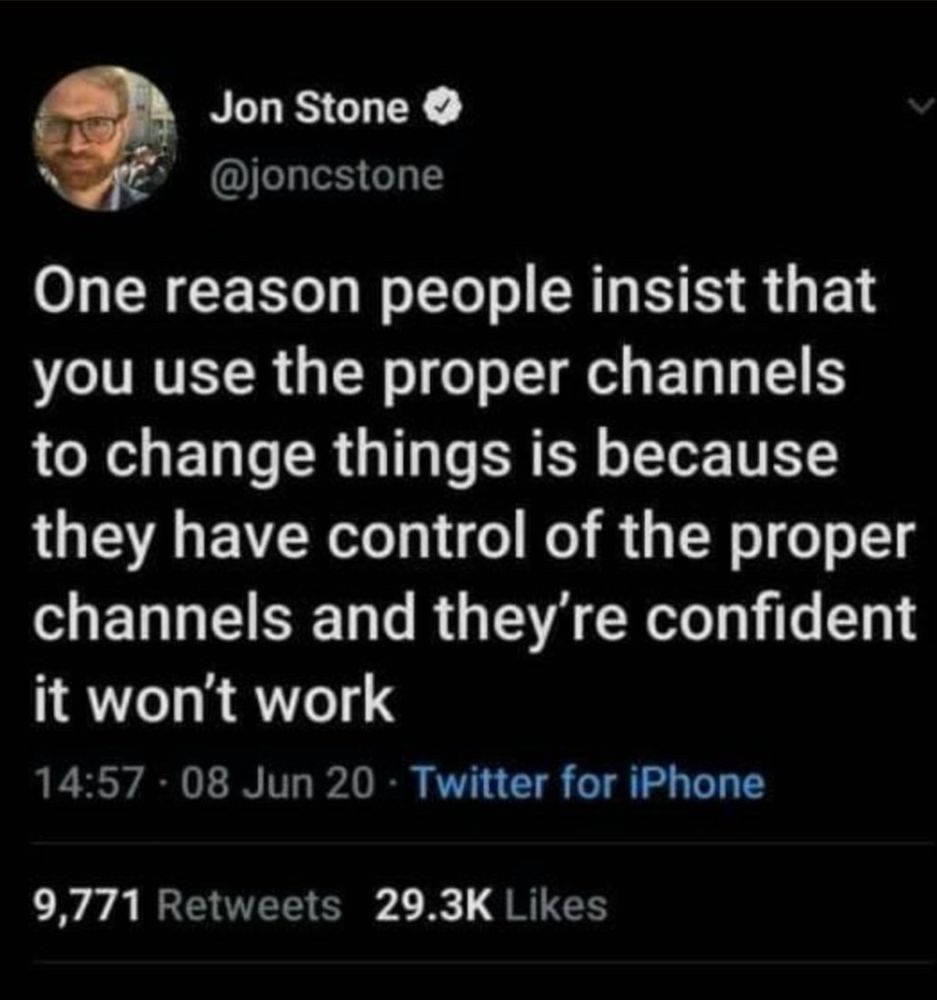
One reason people insist that you use the proper channels to change things is because they have control of the proper channels and they’re confident it won’t work Tweet by @joncstone
14.12.2024 16:22 — 👍 1057 🔁 176 💬 3 📌 2
She's providing wonderful updates on the insurrection in Georgia. Including this.
03.12.2024 04:26 — 👍 285 🔁 43 💬 3 📌 1
YouTube video by Ricochet Media
(FULL FILM) Killer Water: The toxic legacy of Canada's oil sands industry for Indigenous communities
(1/8) To kick off 2024, Ricochet won the 2024 Canadian Hillman prize for our doc Killer Water. Through our innovative collab with @therealnews.com + @indiginews.bsky.social, Brandi Morin and Geordie Day expose the damning repercussions of the Alberta oil sands.
WATCH: tinyurl.com/kllrwater
28.11.2024 23:39 — 👍 16 🔁 11 💬 2 📌 1
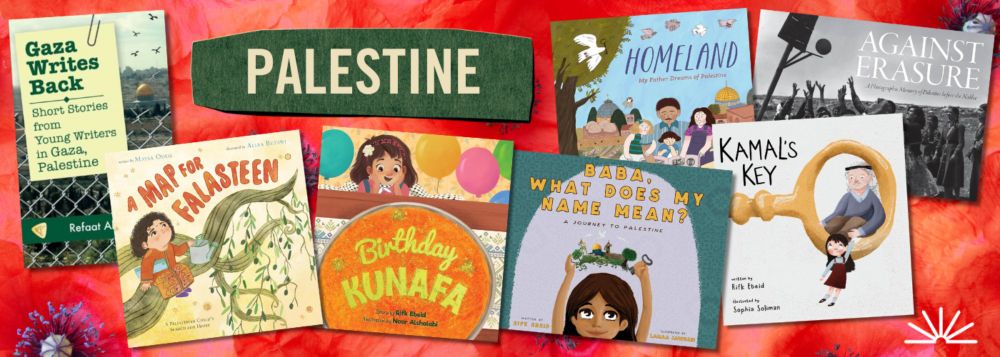
Palestine | Social Justice Books
Recommended titles for pre-K–12 and adults on Palestine.
There are new picture books on Palestine that we recommend for schools, libraries, homes -- including "A Map for Falasteen," "Kamal's Key," and "Birthday Kunafa."
See these and more on @teachingchange.bsky.social's Social Justice Books list ⬇️.
socialjusticebooks.org/booklists/pa...
30.11.2024 17:39 — 👍 27 🔁 5 💬 1 📌 0
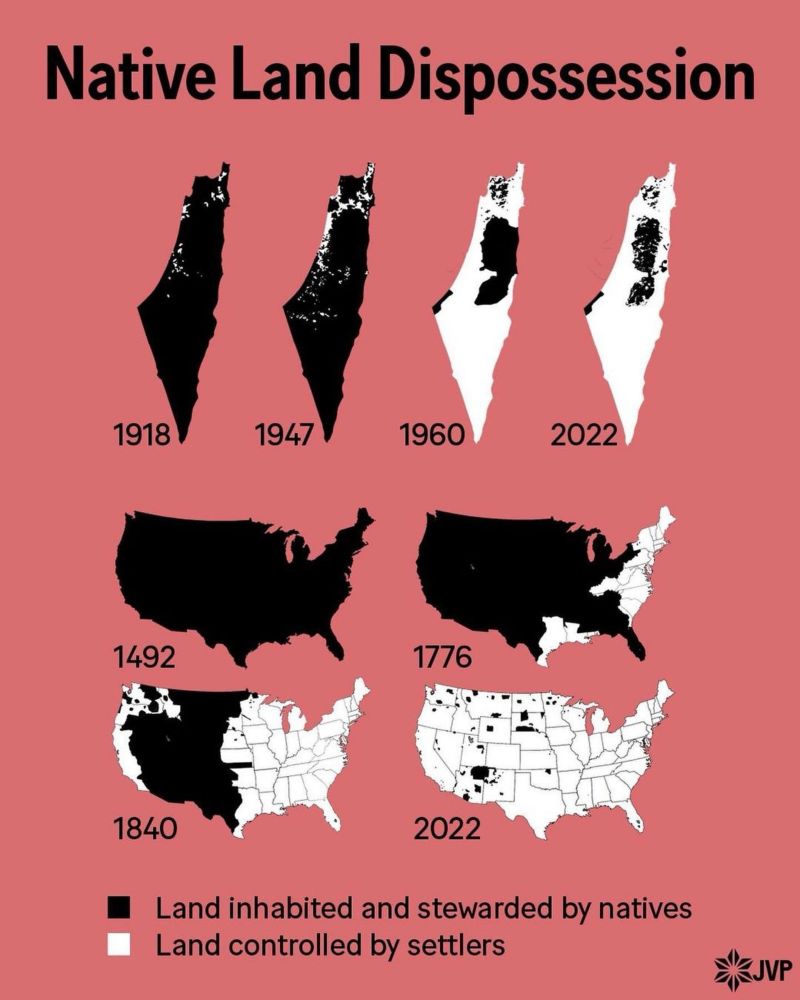
Two set of land maps showing gradual land dispossession over time of Indigenous peoples via settler colonialism in Palestine and what has become the United States. The map key shows land “inhabited and stewarded by native peoples” and “land controlled by settlers”. Both countries show four maps each. The Jewish Voices for Peace logo in on the bottom right corner as identifying the source of the graphic.
From X credit: @jvp.bsky.social “Today & every day, we contemplate parallels between the colonization of Turtle Island and Palestine. Supporting Palestinians’ right to return and right to self-determination in their homeland goes hand in hand with supporting Indigenous people’s demand for #LandBack”
28.11.2024 19:44 — 👍 463 🔁 233 💬 4 📌 6
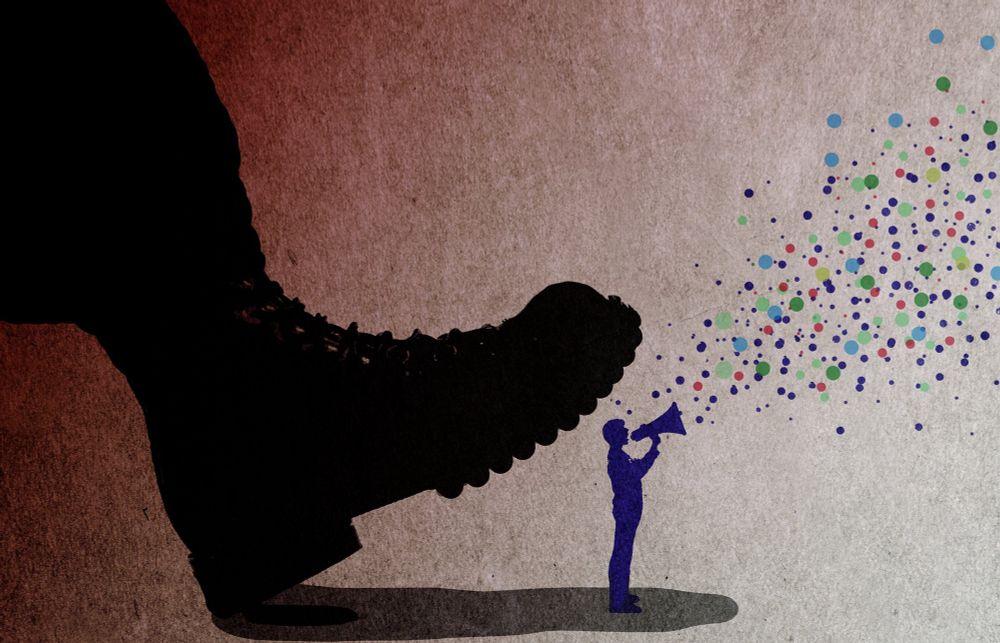
The Right Has a 150-Page Battle Plan to Shut Down Progressive Civil Society
Attacks on Palestine solidarity are the opening salvo in the right’s stated plan to suppress social justice groups.
The 150-page plan proposes to target groups with a wide array of attacks, ranging from stripping organizations of their nonprofit status, to filing RICO charges, to deporting immigrants who protest, to filing class-action lawsuits against groups like Students for Justice in Palestine.
27.11.2024 21:53 — 👍 328 🔁 190 💬 14 📌 25
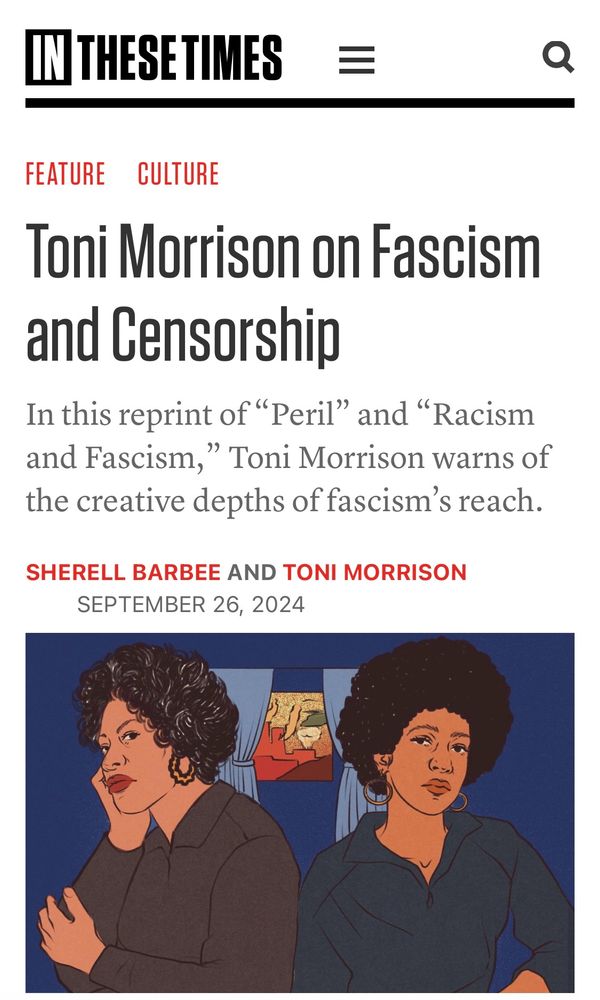
Your homework. inthesetimes.com/article/toni...
20.11.2024 02:57 — 👍 1599 🔁 669 💬 58 📌 41
This obsession is unhealthy. Our horizons are fine. Also social media, for most, is not a job. It is not school. It is socializing. And it’s fine to say “I don’t want to hang out with Nazis, homophobes, transphobes etc in my free time.”
22.11.2024 15:12 — 👍 7698 🔁 1689 💬 204 📌 84
I haven't watched this yet but am curious as to how much analysis was directed towards how students respond to the structures of the education system.
22.11.2024 04:10 — 👍 0 🔁 0 💬 0 📌 0
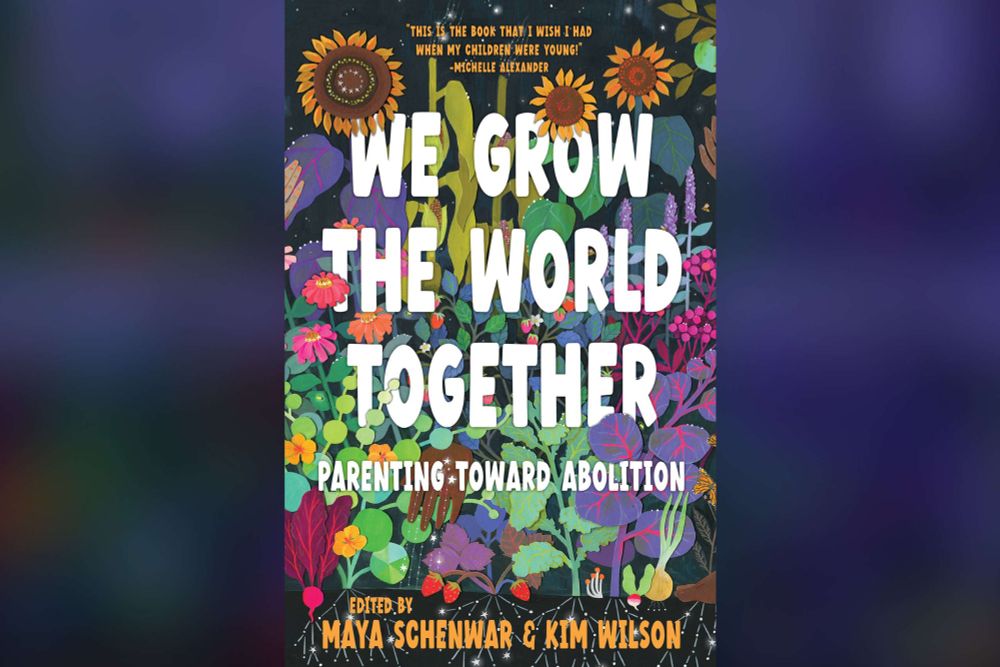
Abolition Work Shows Us There’s Joy to Be Found Even as the World Is on Fire
Care work and parenting work are not an accessory to abolition — they are core to the struggle itself.
"To resign ourselves to the current conditions is to deny our collective power, and we harness that power by showing up for each other, over and over again—even when it’s difficult."
--Kim Wilson said in our @truthout.org interview with George Yancy
truthout.org/articles/abo...
21.11.2024 22:22 — 👍 150 🔁 38 💬 2 📌 4
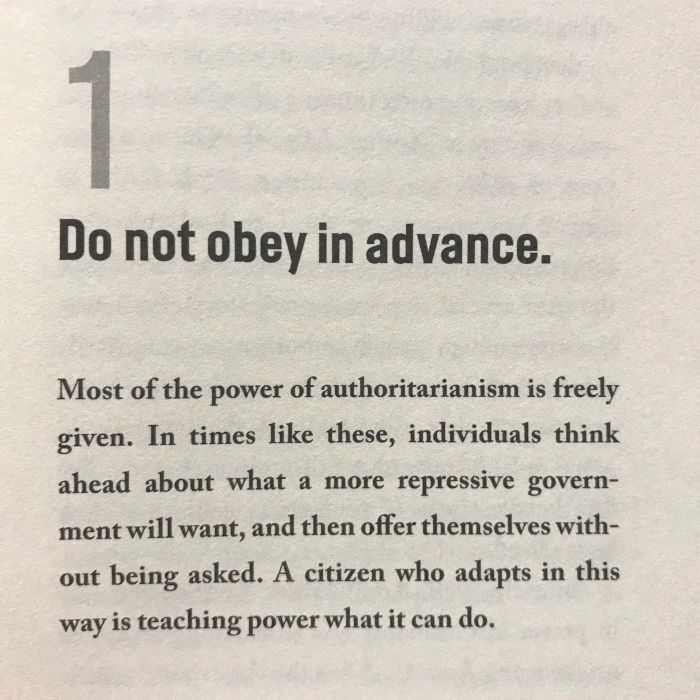
Excerpt from Timothy Snyder's "On Tyranny:"
"1. Do not obey in advance."
"Most of the power of authoritarianism is freely given. In times like these, individuals think ahead about what a more repressive government will want, and then offer themselves without being asked. A citizen who adapts in this way is teaching power what it can do."
A lil tip for the folks with shoe polish on their lips today :)
20.11.2024 17:34 — 👍 17521 🔁 3187 💬 240 📌 118
First Post Intro!
I've been a teacher for 15 years working in Nova Scotia, Alberta, and now Ontario.
My teaching practice is centered on teaching for equity and social justice while fostering hope for a better world.
I love my home in the borderlands and the pizza here is pretty good too! #yqg
21.11.2024 03:35 — 👍 3 🔁 0 💬 2 📌 0
As someone who studies evil: yup. Evil is a process and made possible by ordinary folks like us. Similarly, good persists through the constant dedication of (usually small scale) communities, and people who refuse to give up (but they do need to lean on each other when resting and recovering)
17.11.2024 23:10 — 👍 3 🔁 1 💬 0 📌 0
Politics, author of Dangerous Memory: Coming of Age in the Decade of Greed / Cobalt:Cradle of the Demon Metals Lead singer with Grievous Angels. Just a boy from Cobalt.
Not a space for the cynical and snide.
Asst. Prof @windsorlaw.bsky.social. JD+PhD. Researching #lawandprotest, movement defence & injunctions. Activist. Lawyer. Jugoslovenka. Cyclist. Aging punk. Windsor+Toronto via Belgrade. she/her/comrade. #SFSN 🍉
Gaa-zagaskwaajimekaag Anishinaabe | Indigenous Geographies and Climate Justice | Director, GIF Lab | Public Scholar | Adjunct Prof at the University of British Columbia | Ohio State, Minnesota-Duluth, St. Cloud State alum | Posts = my views.
The Toronto District School Board is Canada's largest school board and welcomes more than 239K students each day. Account is not monitored 24/7.
Highlighting news and events in and around Windsor, Ontario
Tracy Martens is host of YQG In Bloom Podcast & YouTube channel interviewing local businesses and people in the Windsor/Essex County, Ontario region.
Reach out to collab: yqginbloom@gmail.com
Advocating for the use and advancement of an interconnected transit system in Windsor-Essex 🇨🇦🚌
K12 Educator
GenX-er
Inquisitive
Gemini ♊️
Huge Sports Fan: Ravens, Liverpool FC, Warriors, LV Aces, Demon Deacs
Powered by petty and chai lattes.
"Try Jesus, don't try me." -Black
woman proverb
TSJ is an organization of teachers, academics, administrators, pre-service teachers, and other educators working for social justice.
Register for our upcoming Curriculum Fair!
bit.ly/TSJCF2023
sites.google.com/view/tsjcf2023
Writer. Researcher. All things public education, access, and disability studies.
English teacher-Comic Fan-Lifter of Heavy things-Hype man for awesome teachers. “One of the few qualified…” still makes me laugh. Thanks nemesis for that gift.
Educator|Author: "TeachTruth"
(haymarketbooks.org/books/2493-teach-truth), Co-editor “Black Lives Matter at School,” & TeachingForBlackLives.org | Co-editor, Rethinking Schools|Website: IamAnEducator.com | 4 booking: speakoutnow.org/speakers/jesse-hagopian
Nonprofit magazine & book publisher dedicated to sustaining & strengthening public education through social justice teaching and education activism.
rethinkingschools.org
The Official Bluesky Account for Drew Dilkens - Father, Husband, Lawyer, and champion for one of Canada’s most diverse and magnificent cities!
https://www.citywindsor.ca/mayorandcouncil/pages/mayor-drew-dilkens.aspx
Head of Strategic Integration @greenpeaceca.bsky.social (Greenpeace Canada)
Born in California raised in Quebec, made home somewhere in between (qathet). Serious about climate change, human rights and maple syrup.
I unfollow anyone sharing A.I. images
Esensininiwag-Ikwe — Member of the #LittleShell Tribe of Montana 🦬🪶⚜️☘️
Anishinaabe, Nêhiyaw, Michif ♾️
Award-losing national bestselling Métis author of "Indigenous Writes: A Guide to First Nations, Métis & Inuit in Canada", from manitow-sâkahikan/Lac Ste. Anne in so-called Canada. Trying to debunk myths. She/her/wiya
https://linktr.ee/apihtawikosisan
Director, CCPA National Office
https://bsky.app/profile/policyalternatives.bsky.social
The CCPA is Canada's leading progressive policy research institute. We offer independent, non-partisan research on social, economic & climate justice.
www.policyalternatives.ca
Instagram & FB: policyalternatives
Journalist. Entrepreneur. Kwantlen FN, Nooksack Tribe. rjago.substack.com / knowledgekeepr.ca

















